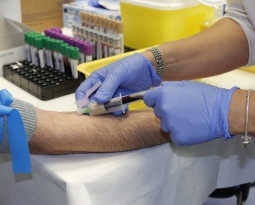Maryland Patent of the Month – April 2021
Multiple drug resistant bacteria are on the rise contributing to approximately 23, 000 deaths annually in the United States. In response, there are many alternative clinical treatments being developed for use against bacterial infections. One solution, Bacteriophages (phage), are a diverse set of viruses that replicate within and kill certain bacterial hosts. Phage therapy was largely abandoned following the discovery of penicillin, but is back in the limelight. Phage development can be complicated as they have a narrow host range and so you have to find the correct phage for the bacteria at hand. Additionally, bacteria mutate quickly which means a phage can become ineffective during clinical treatment. Adaptive Phage Therapeutics, Inc. (APT) is developing rapid screening methods to determine bacterial susceptibility to a specific phage strain to speed up the process.
Existing screening methods use bacterial cultures and growth curves for each specific strain of bacteria. APT’s method is much more rapid which means treatment is not delayed as a result of screening processes. They use cell-free based kits to predict the sensitivity of a bacteria to a phage strain – it also works to test with antibiotics and other therapeutic methods. A pattern search and analysis is used to identify and select these therapeutic molecules which would successfully treat bacterial infections. Through machine learning, the system searches and compares the genomes of the bacteria and phage to determine if the phage would be able to kill, lyse, or inhibit the growth of the bacteria. These patterns can also help identify if the bacteria would be especially resistant or synergistic with the phage. This rapid screening provides great insight into bacterial infection treatment options and removes the waiting associated with cell cultures.
Are you developing new software for an existing application? Did you know your development work could be eligible for the R&D Tax Credit and you can receive up to 14% back on your expenses? Even if your development isn’t successful your work may still qualify for R&D credits (i.e. you don’t need to have a patent to qualify). To find out more, please contact a Swanson Reed R&D Specialist today or check out our free online eligibility test.
Who We Are:
Swanson Reed is one of the U.S.’ largest Specialist R&D tax advisory firms. We manage all facets of the R&D tax credit program, from claim preparation and audit compliance to claim disputes.
Swanson Reed regularly hosts free webinars and provides free IRS CE and CPE credits for CPAs. For more information please visit us at www.swansonreed.com/webinars or contact your usual Swanson Reed representative.

















